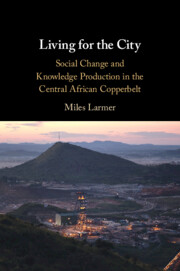Living for the City
Living for the City is a social history of the Central African Copperbelt, considered as a single region encompassing the neighbouring mining regions of Zambia and the Democratic Republic of Congo. The Haut-Katanga and Zambian Copperbelt mine towns have been understood as the vanguard of urban ‘modernity’ in Africa. Observers found in these towns new African communities that were experiencing what they wrongly understood as a transition from rural ‘traditional’ society – stable, superstitious and agricultural – to an urban existence characterised by industrial work discipline, the money economy and conspicuous consumption, Christianity, and nuclear families headed by male breadwinners supported by domesticated housewives. Miles Larmer challenges this representation of Copperbelt society, presenting an original analysis that integrates the region’s social history with the production of knowledge about it, shaped by both changing political and intellectual contexts and by Copperbelt communities themselves. This title is available as Open Access on Cambridge Core.
Miles Larmer is Professor of African History in the Faculty of History and African Studies Centre, St Antony’s College, University of Oxford, and Research Fellow in the Department of Historical and Heritage Studies at the University of Pretoria. A Fellow of the Royal Historical Society, he is the author of The Katangese Gendarmes and War in Central Africa, with Erik Kennes (2016), Rethinking African Politics: A History of Opposition in Zambia (2011) and Mineworkers in Zambia: Labour and Political Change in Post-Colonial Africa, 1964–1991 (2007).

